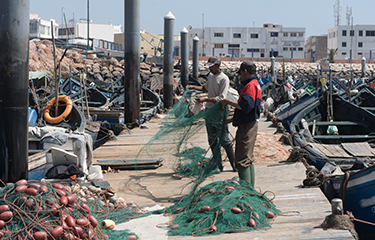Morocco to expand MPAs, increase anti-IUU funding

Morocco Prime Minister Aziz Akhannouch said the country hass committed to expanding the country's marine protected areas and doubling the resources the country currently expends annually in its fight against illegal, unreported, and unregulated (IUU) fishing.
Akhannouch told the One Ocean Summit 2022 participants in Brest, France, that efforts by North Africa country’s national leadership to ensure sustainable fishery management has enable Morocco to achieve “enormous development,” the Morocco World News reported. A World Bank report found the country’s fishing and fish processing activities have provided 700,000 jobs, though many are informal.
Akhannouch reported Morocco is grappling with challenges related to reproduction and recovery of fisheries resources in the Mediterranean, and urged participants at the One Ocean Summit to push for enhanced marine sustainability measures.
Currently only 0.68 percent, or 1,866 square kilometers, of Morocco’s coastline is covered by marine protected areas. The country’s total marine and coastal area spans approximately 276,136 square kilometers. Morocco's announcement it hopes to expand its MPA coverage has attracted support from MedFund, a Monaco-based nonprofit organization providing sustainable funding for marine biodiversity conservation. In October 2020, it provided funding to assist the assessment process, and has contributed funds toward more-effective management of marine protected areas in the Mediterranean, France, Monaco, and Tunisia.
A new round of MedFund financing will support the creation of two new MPA locations. The first is the 480-square-kilometer Al Hoceima National Park in the northeast of the country, an area with rocky cliffs that “make it highly valued fishing area whose resource is to be preserved,” MedFund said. The second will be located in the 322-square-kilometer Jbel Moussa area, which is home to “an exceptional natural terrestrial and marine heritage.”
Morocco has previously been cited as an example of a country where progress has been made in the fight against IUU –especially among small-scale fishing vessels. Every fishing vessel in Morocco has a permit that serves to identify it, and which must always be kept on board – in addition to being fitted with a radio frequency identification device containing information about the owner, registration, and fishing-license information – making it easier to be read by an inspector via a hand-held device.
Morocco's push to expand its MPA coverage and combat IUU comes after a European Union court invalidated a fish trade deal between the E.U. and Morocco. The court ruled that the fisheries partnership agreement between the bloc and the country was invalid due to the inclusion of fisheries within the jurisdiction of the Western Sahara. The trade and fisheries deal had allowed 128 E.U. vessels coming from Spain, Portugal, France, Germany, Lithuania, Latvia, Poland, Netherlands, Ireland, Italy, and the United Kingdom to fish in the Moroccan exclusive economic zone. But after a petition by nationalist groups from Western Sahara, a disputed territory on the northwest coast, and in the Maghreb region of North and West Africa, the General Court of the European Union, the bloc’s second-highest court, found the agreement didn’t have the consent of the people in the region.
“The court takes the view that, in so far as the agreements at issue apply expressly to Western Sahara and, as regards the decision concerning the Sustainable Fisheries Partnership Agreement, to the waters adjacent to that territory, they concern the people of that territory and require the consent of its people,” the court said.
Photo courtesy of Ilyas Kalimullin/Shutterstock






Share